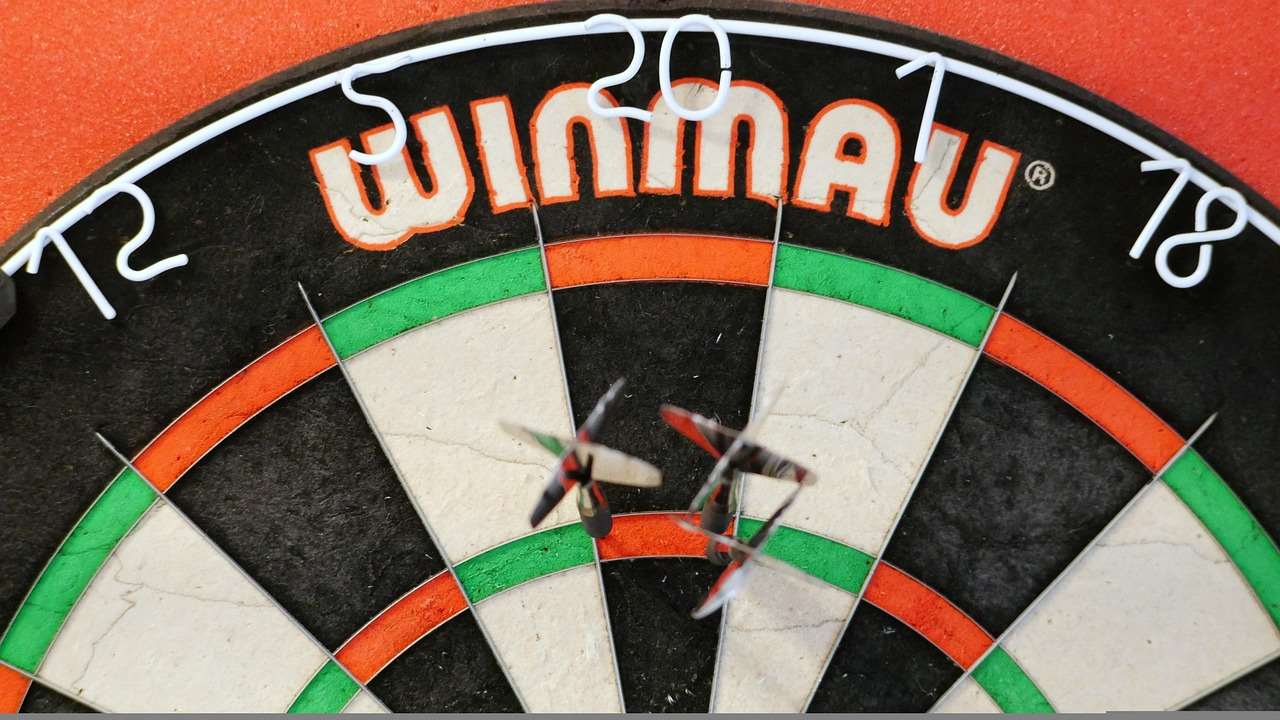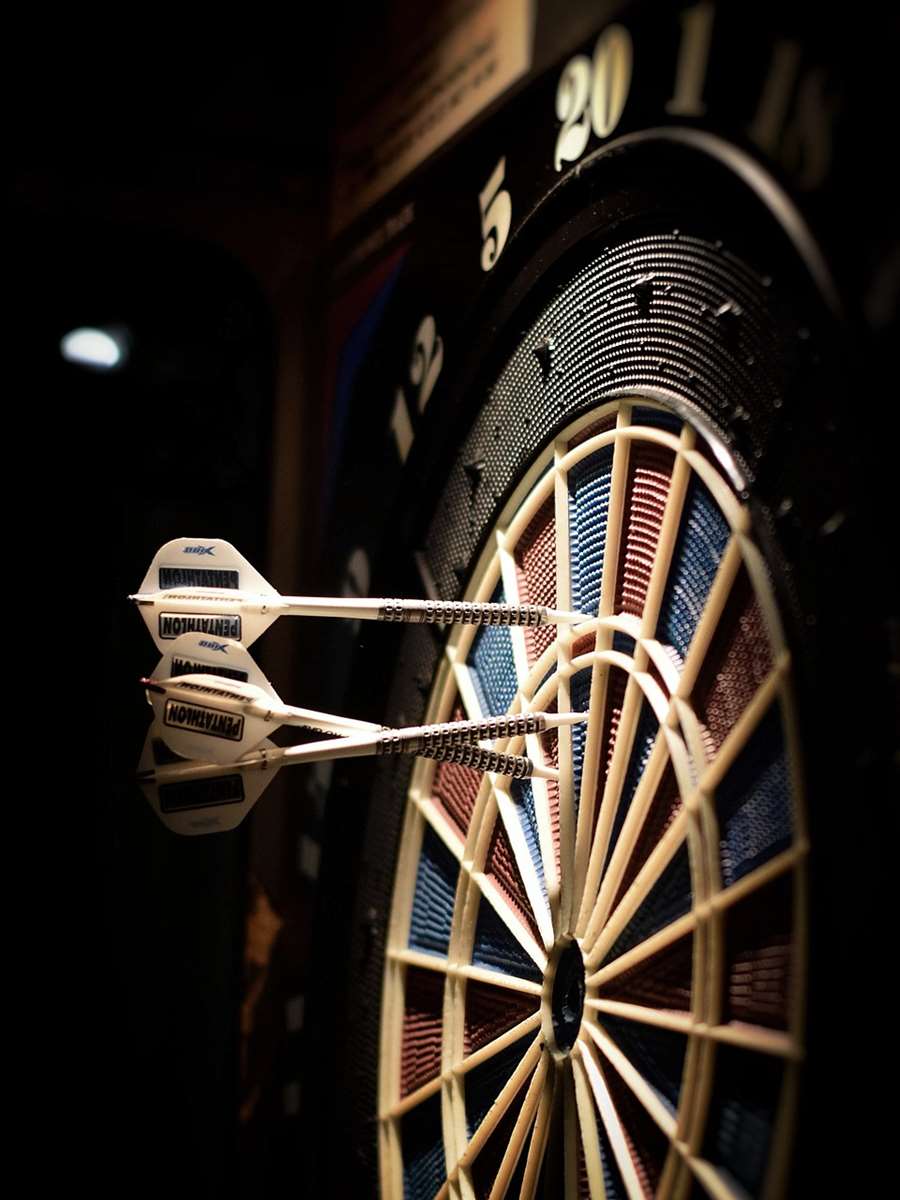To effectively play 501 darts, you need to be comfortable with basic subtraction and mental arithmetic. This article will guide you through the essential basic math skills needed for 501 darts, covering scoring, checkouts, and strategies to improve your game.
⚠️ Still Using Pen & Paper (or a Chalkboard)?! ⚠️
Step into the future! The Dart Counter App handles all the scoring, suggests checkouts, and tracks your stats automatically. It's easier than you think!
Try the Smart Dart Counter App FREE!Ready for an upgrade? Click above!
The Foundation: Addition and Subtraction in Darts
At its core, darts is a game of addition and subtraction. You are constantly adding up your score for each turn (three darts) and subtracting that total from the starting score of 501. While you might not need complex algebra, a solid understanding of these operations is vital. Let’s break it down further.
Calculating Your Score per Round
Each dart you throw can score between 0 and 60 points (triple 20). To calculate your round score, you simply add the value of each dart. For example:
- Dart 1: 20
- Dart 2: 18
- Dart 3: 7
- Total Round Score: 20 + 18 + 7 = 45
Quick mental math is key here. Practice breaking down numbers into smaller, more manageable chunks. For example, instead of 20 + 18 + 7, think 20 + (10 + 8) + (5 + 2), which can be easier to add mentally.
Subtracting from 501
Once you know your round score, you need to subtract it from your current total. This is where many beginners struggle. Again, breaking down the numbers can help. Let’s say your current score is 423, and you score 60 in a round:
- 423 – 60 = ?
Think: 423 – 60 = 363. This seems straightforward, but when dealing with larger numbers or needing to “borrow” from the hundreds column, it can get trickier. Practice makes perfect. Consider using a whiteboard or notepad for practice games to build your confidence in subtraction.
Mastering the Checkout: The Art of Finishing Strong
One of the most crucial aspects of 501 darts is mastering the checkout. This refers to the final throw(s) needed to reduce your score to exactly zero, ending with a double. This requires a deeper understanding of basic math skills needed for 501 darts, and a familiarity with common checkout combinations.

Understanding Double Numbers
To win a game of 501, you must finish on a double. This means your last dart must land in the double ring of a number. The double values range from Double 1 (2 points) to Double 20 (40 points). Knowing these values instantly is crucial for planning your checkout strategy. Memorizing the double values will significantly improve your game. You can find helpful charts online or create your own for practice.
Common Checkout Combinations
Certain checkout combinations are more common and easier to execute than others. Here are a few examples:
- 40: Double 20 (D20) – The most common checkout.
- 32: Double 16 (D16)
- 16: Double 8 (D8)
- 4: Double 2 (D2)
Beyond these, you need to learn how to set up these checkouts. For example, if you have 50 remaining, you might aim for a single 10 with your first dart, leaving 40 for a D20 checkout. Understanding how to leave yourself on a double is a critical skill.
Planning Your Checkout Strategy: Ahead of the Game
The best players don’t just react to their score; they plan their checkouts several throws in advance. This involves considering possible outcomes and aiming for specific numbers to leave themselves on a favorable double. This is a complex skill, but it stems from those basic math skills needed for 501 darts, and practice. Planning ahead is an advanced strategy based on strong fundamental math.
Beyond the Basics: More Advanced Math Concepts in Darts
While addition, subtraction, and a good understanding of doubles are the foundations, more advanced math concepts can further enhance your game. Don’t let this intimidate you; these concepts are simply extensions of the basics.
Averaging and Statistical Analysis
Many serious darts players track their scores and calculate their averages. This allows them to assess their performance and identify areas for improvement. Calculating your darts average involves adding up your total scores over a number of games and dividing by the number of games played. This gives you an indication of your consistency.
Risk Assessment and Strategic Choices
Sometimes, you’ll face situations where there isn’t a clear “best” option. You might need to decide whether to go for a risky shot that could set up a high checkout or play it safe and aim for a smaller score. This requires assessing the probabilities of success and failure, which is a form of statistical reasoning. Basic Darts Fundamentals for Beginners, helps provide a strong foundation before moving on to these more advanced concepts.

Practical Tips for Improving Your Math Skills in Darts
Improving your basic math skills needed for 501 darts doesn’t require hours of studying. With consistent practice and the right strategies, you can significantly enhance your game.
Practice Mental Math Regularly
Dedicate time each day to practicing mental math. Use online resources, apps, or even create your own practice problems. Focus on addition and subtraction with numbers up to 180 (the maximum score for one round). Consider timing yourself to build speed and accuracy.
Use a Darts Calculator
While it’s important to develop your mental math skills, using a darts calculator can be helpful for practicing checkout combinations. There are many free apps and websites that can suggest optimal checkouts for any remaining score. However, rely on these sparingly and focus on understanding the logic behind the suggestions.
Play Practice Games with a Focus on Checkouts
Instead of just playing regular games, dedicate some practice sessions solely to checkouts. Start with a specific score (e.g., 100) and try to check out in as few darts as possible. Experiment with different combinations and learn what works best for you. Explore Fun dart game variations with modified rules for fresh perspectives and challenges.
Record and Analyze Your Games
Keep track of your scores, averages, and checkout percentages. This data will provide valuable insights into your strengths and weaknesses. Identify patterns in your game and focus on improving the areas where you struggle the most.
Dealing with Pressure: Maintaining Math Accuracy Under Stress
Even if you’re a math whiz in practice, the pressure of a real game can make it difficult to think clearly. Here are some tips for maintaining your accuracy under stress:
Take Deep Breaths
When you feel your heart racing and your mind clouding, take a few deep breaths to calm your nerves. This can help you focus and think more clearly.
Visualize Your Calculations
Before each throw, take a moment to visualize the numbers and the calculation you need to perform. This can help you stay focused and avoid mistakes.
Develop a Pre-Throw Routine
Having a consistent pre-throw routine can help you stay grounded and focused. This routine might involve a specific stance, grip, or breathing pattern. This routine will help calm any last minute nerves and allow you to focus on the basic math skills needed for 501 darts.
Don’t Be Afraid to Ask for Help
If you’re playing in a casual game, don’t be afraid to ask your opponent to double-check your score. It’s better to be safe than sorry.
Basic Math Skills Needed for 501 Darts: A Summary of Essential Concepts
To excel at 501 darts, you need a strong foundation in basic arithmetic, particularly addition and subtraction. You also need to develop a good understanding of double numbers and common checkout combinations. Additionally, Adapting darts rules for beginners can provide a less intimidating starting point. By practicing your mental math skills, analyzing your games, and developing strategies for staying calm under pressure, you can significantly improve your performance and enjoy the game even more.

Key Skills Recap
- Addition: Quickly adding up the score for each round (three darts).
- Subtraction: Accurately subtracting your round score from your current total.
- Doubles Knowledge: Instantly recognizing the value of each double number.
- Checkout Planning: Strategically planning your throws to leave yourself on a favorable double.

Resources to Help Improve Your Darts Math
Many resources are available online and offline to help you hone your math skills and improve your darts game.
Online Darts Calculators
Websites and apps offer interactive darts calculators that can suggest optimal checkouts and help you practice different scenarios.
Darts Training Apps
Several mobile apps provide structured training exercises to improve your throwing accuracy and mental math skills.
Darts Forums and Communities
Engage with other darts players in online forums and communities to share tips, strategies, and practice routines.

Conclusion: Sharpen Your Skills and Aim for Success
Mastering the basic math skills needed for 501 darts is fundamental to becoming a proficient player. By focusing on addition, subtraction, understanding doubles, and developing checkout strategies, you can significantly improve your game. Remember to practice regularly, analyze your performance, and stay calm under pressure. Now, pick up those darts, put your math skills to the test, and aim for that perfect checkout!
Hi, I’m Dieter, and I created Dartcounter (Dartcounterapp.com). My motivation wasn’t being a darts expert – quite the opposite! When I first started playing, I loved the game but found keeping accurate scores and tracking stats difficult and distracting.
I figured I couldn’t be the only one struggling with this. So, I decided to build a solution: an easy-to-use application that everyone, no matter their experience level, could use to manage scoring effortlessly.
My goal for Dartcounter was simple: let the app handle the numbers – the scoring, the averages, the stats, even checkout suggestions – so players could focus purely on their throw and enjoying the game. It began as a way to solve my own beginner’s problem, and I’m thrilled it has grown into a helpful tool for the wider darts community.